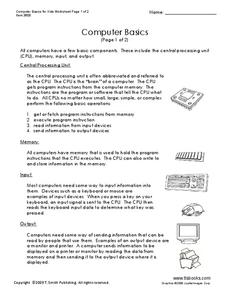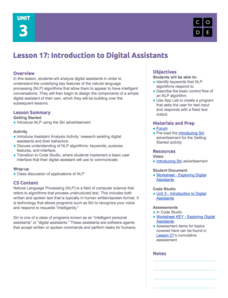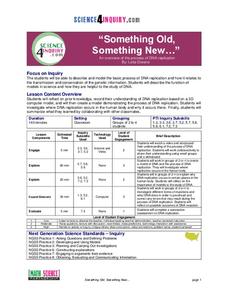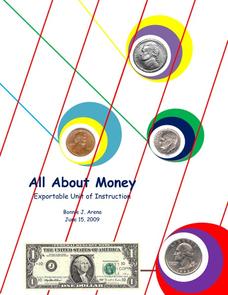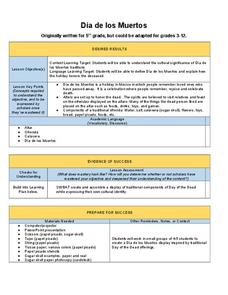T. Smith Publishing
Computer Basics for Kids Worksheet
This informational reading learning exercise can be used in your literacy or computer class. Students learn the basic components of computers then test their knowledge with multiple choice and fill-in-the-blank questions.
Code.org
Looping and Simulation
Young computer scientists continue programming with while loops by creating a program to simulate coins flipping.
Code.org
Introduction to Digital Assistant Project
How does a computer recognize voice commands? Scholars learn about digital assistants and natural language processing (NLP) algorithms in the ninth activity of the series. They begin building a simple digital assistant and work on this...
Code.org
HTTP and Abstraction on the Internet
Introduce your class to the layers of abstraction of the Internet with a activity on the HTTP protocol. Pupils review previous lessons on levels of the Internet, then investigate new high levels by examining the HTTP traffic on their own...
Code.org
Keys and Passwords
Scholars explore the relationship between cipher keys and passwords and as they learn more about the Vigenere cipher and continue to read from the book Blown to Bits in the seventh lesson plan of the series. They conduct an activity...
Visa
Using Credit Wisely
Receiving credit can be both a benefit and a curse. Prepare your learners to make wise credit choices by studying how credit influences credit scores, identifying the different components of credit cards, and exploring major consumer...
Federal Reserve Bank
GDP: Does It Measure Up?
Here is resource that offers a very clear explanation for how economists measure economic growth by comparing real GDP over time. There is also an additional worksheet that details the expenditure method and four components for...
Chicago Botanic Garden
The Carbon Cycle
There is 30 percent more carbon in the atmosphere today than there was 150 years ago. The first lesson in the four-part series teaches classes about the carbon cycle. Over two to three days, classes make a model of the cycle, add missing...
TED-Ed
What is the World Wide Web?
Did you know that the World Wide Web and the Internet are not the same thing? Did you know that Tim Berners-Lee is considered the father of the Web? Networks, web servers, web hosts, website addresses, domain names, web languages,...
Chicago Botanic Garden
Carbon, Greenhouse Gases, and Climate
Climate models mathematically represent the interactions of the atmosphere, oceans, land, sun, surface, and ice. Part two in the series of four lessons looks at the role greenhouse gases play in keeping Earth warm and has participants...
Code.org
Cracking the Code
Scholars learn how to crack secret codes as they continue reading from the Blown to Bits and try to crack the random substitution cipher. They also begin learning about the Vigenere cipher.
PBS
Stories of Painkiller Addiction: Learning About Opioids
Feeling high is not the only side effect of abusing prescription opioids. Middle and high schoolers learn more about specific painkillers, including Fentanyl, Oxycodone, and Clonazepam, as well as their common brand names and extensive...
Teach Engineering
Complex Networks and Graphs
Show your class how engineers use graphs to understand large and complex systems. The resource provides the beginnings of graph theory by introducing the class to set theory, graphs, and degree distributions of a graph.
NASA
The Atmospheric Filter
What is the difference between a comet and a meteoroid? An educational lesson includes five demonstrations of how the atmosphere can inhibit our ability to measure many things in the galaxy.
Science 4 Inquiry
"Something Old, Something New..."
Young scientists learn about DNA replication through a video and model creation. They answer analysis questions before exploring the role of mutations and then complete a summative assessment.
Curated OER
All About Money
Few topics engage young mathematicians as much as learning about money. Through a series of shared readings and hands-on activities, children explore the US currency system, learning how to count money and calculate change as they create...
Growing Classroom
Space Travelers
Groups of three scientists from the rocky planet Zog investigate the composition of soil so that they can take the information back to their home, create soil there, and begin to grow food.
National Wildlife Federation
Green Green Revolution
School budgets don't have a lot of extra money, so when students propose saving the district money, everyone jumps on board. The first lesson in the series of 21 introduces the concept of an energy audit. Scholars form an eco-action team...
Science 4 Inquiry
It's Not All Visible
Electromagnetic waves travel though empty space, something no other wave type can accomplish. Young scientists learn more about the entire spectrum of electromagnetic waves. They sort cards and apply their knowledge to create models of...
Science 4 Inquiry
Frenemies, Bros and Killers: A Lesson in Symbiosis
Animals and plants develop relationships and rely on each other to survive. Pupils learn more about symbiosis through a video, a hands-on matching activity, and a game. They differentiate and describe each type on a written evaluation.
Science 4 Inquiry
Levitation Engineers: Exploring Forces
Levitation tricks have been documented from the early 1900s, so how do they do it? Scholars learn about the force of magnetism in an attractive resource. They watch videos and design experiments to understand the strength and...
Teach Engineering
Circuits
Don't know how to make the initial connection on electric circuits? This lesson provides the background to present the introductory vocabulary to learning about electric circuits. It is organized in a meaningful progression with an...
Vanderbilt University
Dia de Los Muertos
To honor El Dia de los Muertos, scholars work together to create Day of the Dead displays—paper sugar skulls and banners—that bring a festive and memorable flare to the classroom.
Teach Engineering
Biomes and Population Dynamics - Balance Within Natural Systems
How large can a population become? The fifth installment of a nine-part unit teaches young ecologists about limiting factors that determine the carrying capacity of species in the Sonoran Desert. Here is a PowerPoint to help present this...
Other popular searches
- Basic Computer Components
- Computer Components Poster
- Teaching Computer Components
- Autocad Computer Components
- Internal Computer Components
- Auto Cad Computer Components
- Intro Computer Components


